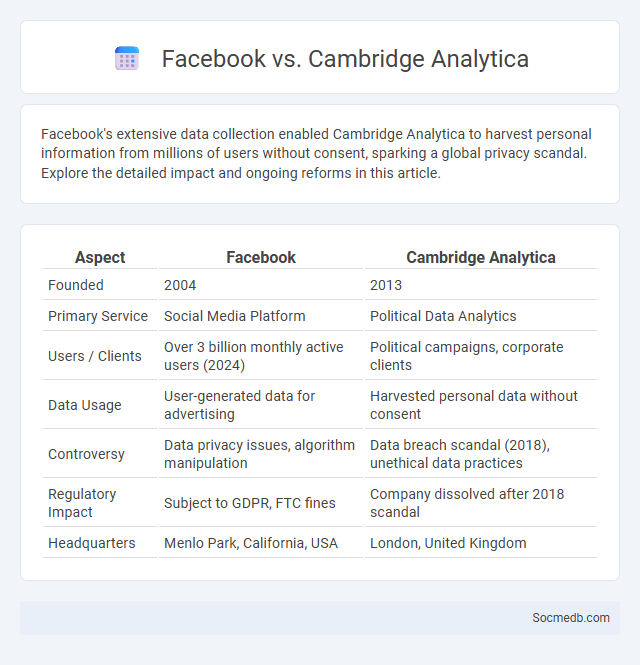
Photo illustration: Facebook vs Cambridge Analytica
Facebook's extensive data collection enabled Cambridge Analytica to harvest personal information from millions of users without consent, sparking a global privacy scandal. Explore the detailed impact and ongoing reforms in this article.
Table of Comparison
| Aspect | Cambridge Analytica | |
|---|---|---|
| Founded | 2004 | 2013 |
| Primary Service | Social Media Platform | Political Data Analytics |
| Users / Clients | Over 3 billion monthly active users (2024) | Political campaigns, corporate clients |
| Data Usage | User-generated data for advertising | Harvested personal data without consent |
| Controversy | Data privacy issues, algorithm manipulation | Data breach scandal (2018), unethical data practices |
| Regulatory Impact | Subject to GDPR, FTC fines | Company dissolved after 2018 scandal |
| Headquarters | Menlo Park, California, USA | London, United Kingdom |
Introduction to the Facebook–Cambridge Analytica Scandal
The Facebook-Cambridge Analytica scandal exposed the unauthorized harvesting of personal data from millions of Facebook users without their consent. This breach highlighted significant vulnerabilities in data privacy and the potential misuse of social media platforms for political profiling and targeted advertising. Your awareness of these risks is crucial in understanding the importance of safeguarding personal information online.
What is a Data Breach?
A data breach occurs when unauthorized individuals gain access to sensitive information such as social media account credentials, personal identification, or private messages. This security incident compromises the confidentiality and integrity of user data on platforms like Facebook, Instagram, or Twitter. Protecting against data breaches requires robust encryption, multi-factor authentication, and vigilant monitoring for suspicious activities.
Cambridge Analytica: Who Were They?
Cambridge Analytica was a political consulting firm that specialized in data mining and analysis to influence voter behavior through targeted advertising on social media platforms. They gained notoriety for harvesting personal data from millions of Facebook users without consent, using this information to create psychological profiles and micro-target political campaigns. Your understanding of social media privacy and data security is crucial to protect personal information from similar exploitation.
How Facebook Data Was Compromised
Facebook data was compromised through unauthorized access by exploiting vulnerabilities in third-party apps and weak privacy settings. Hackers used sophisticated phishing techniques to infiltrate user accounts and gather personal information. You must regularly review app permissions and enhance security measures to protect your data from similar breaches.
The Mechanisms Behind the Data Breach
Social media platforms collect vast amounts of personal data through user interactions, location tracking, and third-party integrations, creating extensive databases vulnerable to cyberattacks. Data breaches often occur via phishing schemes, malware infiltration, or exploiting software vulnerabilities within platform infrastructure. Inadequate encryption and insufficient access controls further expose sensitive user information, leading to compromised accounts and widespread identity theft.
Impact on Facebook Users’ Privacy
Facebook users face significant privacy challenges as the platform collects extensive personal data for targeted advertising and content customization. This data aggregation increases the risk of unauthorized access and misuse of sensitive information, affecting millions globally. Privacy concerns have prompted regulatory scrutiny and user demand for stronger data protection measures on the social media giant.
Regulatory and Legal Repercussions
Social media platforms face increasing regulatory scrutiny regarding user data privacy, content moderation, and misinformation control. Governments worldwide impose stringent legal frameworks such as the GDPR in Europe and the CCPA in California, requiring platforms to ensure transparency and user consent. Non-compliance with these regulations can result in hefty fines and legal actions, emphasizing the need for robust compliance strategies in the social media industry.
Facebook’s Response and Policy Changes
Facebook has implemented extensive response strategies and policy changes to address misinformation, hate speech, and user privacy concerns. The platform has enhanced AI-driven content moderation, introduced stricter advertising transparency rules, and expanded fact-checking partnerships worldwide. These measures aim to create a safer online environment while balancing freedom of expression and regulatory compliance.
Global Reactions and Public Backlash
Social media platforms have become hotspots for global reactions, where viral content sparks immediate responses from diverse audiences worldwide. Public backlash often erupts rapidly, driven by collective outrage or disagreement, influencing brand reputations and political discourse on a global scale. Trends in social media outrage highlight the power of digital communities to mobilize for social justice, corporate accountability, and cultural debates.
Lessons Learned and Future of Data Protection
Social media platforms have revealed critical lessons in data protection, emphasizing vulnerabilities in user privacy controls and the need for robust encryption methods to prevent data breaches. Regulatory frameworks like GDPR and CCPA have shaped compliance standards, fostering greater accountability and transparency in data handling. The future of data protection in social media hinges on advanced AI-driven security measures, decentralized data storage, and stricter user consent protocols to safeguard personal information effectively.
 socmedb.com
socmedb.com